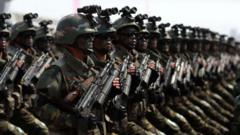Azam Ahmed, a seasoned correspondent, returns to Afghanistan to gain new perspectives on the lingering impacts of the U.S. presence, engaging with Taliban fighters amid unchanged conflicts and guarded suspicions.
Insights from the Frontlines: An Exploration of Afghanistan through a New Lens

Insights from the Frontlines: An Exploration of Afghanistan through a New Lens
A journalist's journey through Afghanistan reveals the complexities of Taliban governance and the country's shifting dynamics post-American withdrawal.
In a remote outpost nestled within unforgiving mountainous terrain, a Taliban member greeted two journalists with skepticism. The atmosphere was tense, underscored by the dilapidated conditions of the trailer serving as their base. As they awaited approval from the Talib, they felt the weight of the surroundings – abandoned, yet alive with the stories of a war-torn land.
The journalist, Azam Ahmed, recounts the challenges of navigating Afghanistan's current political landscape. Despite prior assurances from Taliban members in Kabul, the isolation of the frontier location heightened the uncertainty. Questions posed by the Talib echoed a deeper inquiry into the reasons behind their return to Afghanistan — to gather insights on the fallout of the U.S. withdrawal and to uncover lessons left unlearned from years of conflict.
As reporters, they often encountered muted vehemence, wariness, and occasional collegiality from Taliban members. Ahmed reflects on the hope of comprehending the narratives that persist within Afghanistan post-U.S. exit. The encounter, marked by an attempt to balance curiosity against survival, amplified the complex history between foreign journalists and a now-dominant Taliban regime.
Through this journey, Ahmed and his colleague aimed not merely to report but also to understand the reverberations of an ongoing conflict that continues to define a society full of resilience yet riddled with political entanglement. The guards’ unrelenting gaze and the anticipation of documentation underscored the deep-seated tensions in a region where safety and scrutiny coexist in a fragile balance.
Despite the apprehension stemming from foreign presence, both Ahmed and his colleague remained committed to broadening the understanding of a nation whose future remains as precarious as its present. In doing so, they invite readers to view Afghanistan beyond the lens of conventional narratives that often dominate Western discourse.
The journalist, Azam Ahmed, recounts the challenges of navigating Afghanistan's current political landscape. Despite prior assurances from Taliban members in Kabul, the isolation of the frontier location heightened the uncertainty. Questions posed by the Talib echoed a deeper inquiry into the reasons behind their return to Afghanistan — to gather insights on the fallout of the U.S. withdrawal and to uncover lessons left unlearned from years of conflict.
As reporters, they often encountered muted vehemence, wariness, and occasional collegiality from Taliban members. Ahmed reflects on the hope of comprehending the narratives that persist within Afghanistan post-U.S. exit. The encounter, marked by an attempt to balance curiosity against survival, amplified the complex history between foreign journalists and a now-dominant Taliban regime.
Through this journey, Ahmed and his colleague aimed not merely to report but also to understand the reverberations of an ongoing conflict that continues to define a society full of resilience yet riddled with political entanglement. The guards’ unrelenting gaze and the anticipation of documentation underscored the deep-seated tensions in a region where safety and scrutiny coexist in a fragile balance.
Despite the apprehension stemming from foreign presence, both Ahmed and his colleague remained committed to broadening the understanding of a nation whose future remains as precarious as its present. In doing so, they invite readers to view Afghanistan beyond the lens of conventional narratives that often dominate Western discourse.






















